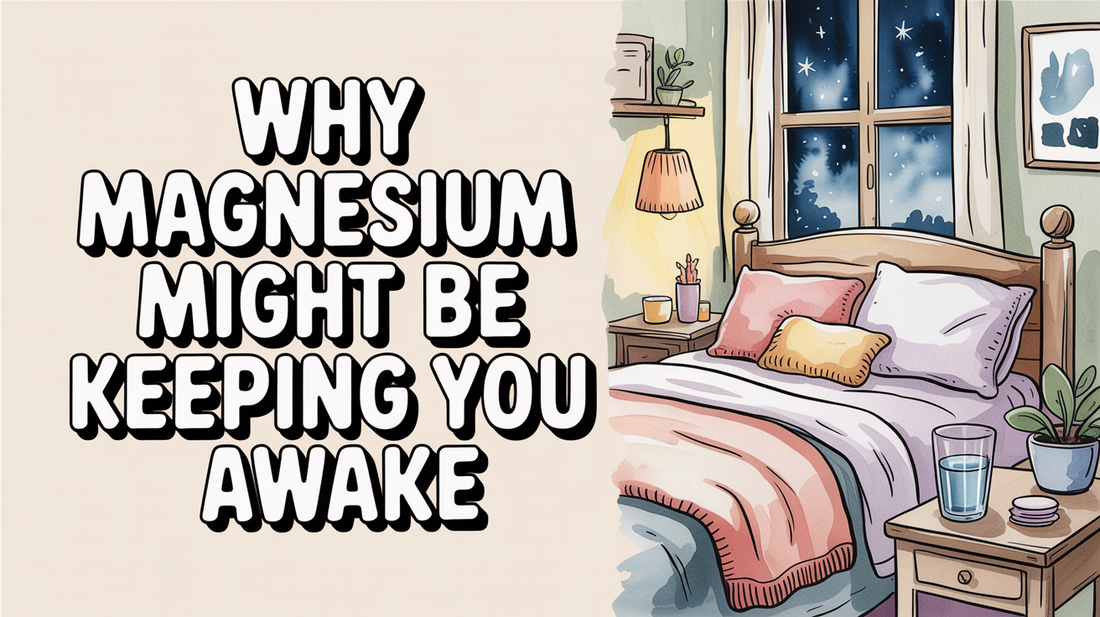Why can't I sleep after taking magnesium?
If you find yourself wondering why you can't sleep after incorporating magnesium into your routine, you're not alone. Many individuals experience magnesium sleep issues, leading to frustration when it seems like magnesium is not working as expected. This article will explore three key reasons that could be causing your insomnia, offering actionable insights to help you take steps toward better sleep tonight.
For some, magnesium may cause stomach upset or interact with other supplements, disrupting sleep
While many people find magnesium to be a helpful addition to their bedtime routine, it's important to remember that individual responses can vary. Some may experience gastrointestinal discomfort, which can interfere with their sleep quality. For example, magnesium can lead to issues like diarrhea or nausea, particularly if taken in high doses or on an empty stomach. This discomfort could result in more trips to the bathroom, disrupting your sleep cycles.
- Magnesium might cause digestive issues such as nausea or cramps, especially when not taken with food.
- Some forms of magnesium, like magnesium oxide, are more likely to cause stomach upset compared to others, such as magnesium glycinate.
- Combining magnesium with stimulating supplements or caffeine can counteract its calming effects, making it harder to unwind at night.
Try It Tonight: Quick Start ✅
- Screen-free + dim lights for 10–15 minutes.
- Gentle stretch or slow breathing (4–7–8).
- Apply Magnesium Spray as directed (e.g., 4–8 sprays on legs/arms/shoulders 10–20 minutes before bed). Patch-test if new to topicals.
Taking too much or at the wrong time (morning vs evening)
The timing and dosage of magnesium supplementation can significantly impact its effectiveness for sleep. For instance, taking magnesium in the morning when its calming effects are best utilized 1-2 hours before bedtime may not yield the desired results. Additionally, excessive doses can lead to unwanted effects such as a laxative effect, causing interruptions during the night.
- Exceeding 400mg daily can result in sleep interruptions due to bathroom trips.
- Starting with a high dose without gradually increasing it can cause digestive discomfort, hindering restful sleep.
- For some, a lower dose of 100-200mg may be sufficient to enjoy the benefits without side effects.
Why We Recommend a Gentle Helper 🌿
Magnesium Spray is crafted for quick absorption and a soothing, non-sticky experience, which may help in establishing a consistent bedtime ritual.
- Quick-absorbing comfort—no heavy residue.
- Gentle feel designed to minimize tingling/itch.
- Clean-leaning and bedtime-friendly scent.
Stress, diet, and screen time may be the real culprits 🔍
Often, lifestyle factors play a significant role in sleep issues, and magnesium alone may not solve the underlying problems. Chronic stress can elevate cortisol levels, counteracting magnesium's calming effects. Similarly, high caffeine intake and excessive screen exposure can overshadow magnesium's potential benefits, making it difficult to unwind and fall asleep.
- Chronic stress can lead to heightened alertness at bedtime, making it hard to relax.
- Consuming caffeine late in the day can disrupt your ability to enjoy a restful night.
- Exposure to blue light from screens before bed can inhibit melatonin production, affecting sleep onset.
Incorporating good sleep hygiene practices and limiting screen time may help maximize the benefits of magnesium supplementation. Consider creating a calming bedtime routine to enhance your overall sleep experience.
- Maintain a consistent bedtime and wake time.
- Create a comfortable sleep environment free from distractions.
- Focus on a balanced diet that includes essential nutrients, alongside magnesium.

